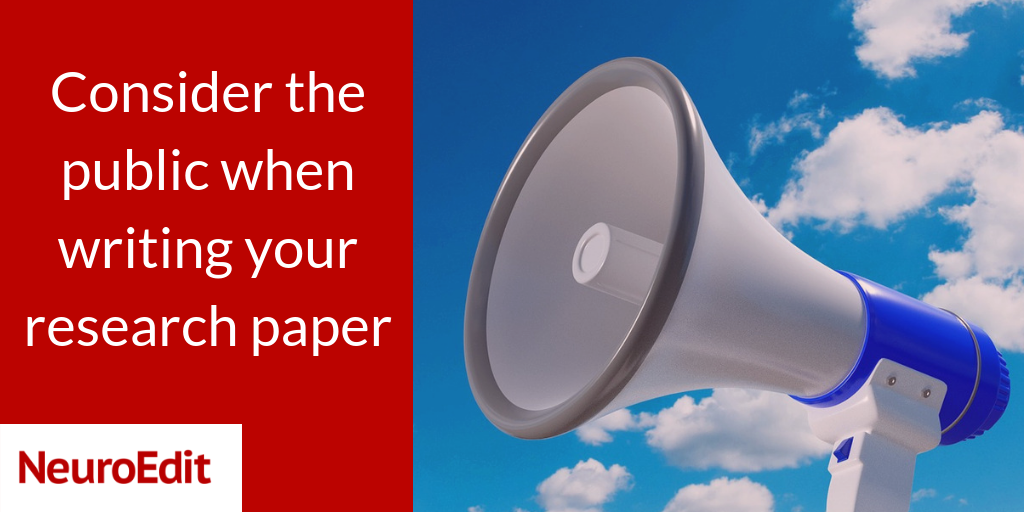|
Post by Julia Slone-Murphy | Photo by Hawksky on Pixabay
This is my final post in this series – so allow me to climb onto my soapbox. I believe this is the most important reason for making your manuscript as good as it can be. If you take one thing from this series, make it this: your readers are not just your peers.
Science is not an exclusive club. Think about the reason you became a researcher; I’m pretty sure it wasn’t because you wanted to compete with your colleagues, fight for funding, or scramble up the career ladder. Most people become researchers to make valuable contributions to society and humanity.
Arguably the most important aspect of writing about science well is to improve science communication as a whole, both for specialist readers and, as far as possible, for any reader. In my view, this is an essential part of scientific publishing.
Think about who might read your paper
Readers can be specialists in your field, in another field, or people who don’t work in research at all. Even if you publish in a journal that's behind a paywall, remember that the abstract can be read by everyone: this includes people seeking information about a medical condition; people in animal rights groups; the media; and people from all walks of life. It’s important to keep these readers in mind from the very first word you write. In particular, it’s worth considering the people who will benefit from the experiments described in your manuscript.
Keep the nonspecialist reader in mind
If you write a stuffy paper full of jargon and long sentences, chances are it will still be published as long as the science is good and the methods are sound. But it will be difficult for anyone outside your field to read; and it will be impenetrable to those who are not familiar with the field. Similarly, if you submit a sloppy paper, riddled with linguistic errors, it might still be published, but the errors may be distracting for the reader and cause them to lose trust in your research. Writing with the nonspecialist reader in mind doesn’t mean dumbing down the science, or writing the whole paper in lay terms. It just means:
Your role in public engagement
You don’t need to be David Attenborough to engage with the public. You don’t have to be an extrovert, or great with kids, or know how to “make science fun”, or be able to confidently explain your research using sporting analogies. When you’re writing, just include a few sentences that would help a non-specialist understand the most important points of your study. How would you explain the take-home message to your neighbour, your dentist, or a family member? Journals are finally getting on board with this, with an increasing number encouraging authors to write “Highlights" and plain-language summaries. But the same points can easily be made in the Abstract and main text, even if specific lay descriptions are not required by the journal. If every researcher did this when writing their manuscripts, it would go a long way towards bridging the void between what scientists and the public understand.
This post concludes our introductory series on the importance of writing research manuscripts well. We’ve explained how writing clearly and engagingly can help you not only communicate science to different audiences, but also beat your competition, get a better peer review, reduce research waste, and publish more effectively.
What would you like us to write about next? Comment below with your questions and suggestions!
We know it can take a lot of time and effort to consider and implement everything we’ve described in this series, but it is worth it. If you feel your time would be better spent doing research than writing about it, scientific editing companies like NeuroEdit exist to take some of this pressure off you. Feel free to send us your draft and we'll be happy to discuss how we can help you improve your chances of fast acceptance, write with the nonspecialist in mind, and even boost citations once the paper is published. Contact us.
0 Comments
Your comment will be posted after it is approved.
Leave a Reply. |
We've helped researchers publish in:
/
- 1
- 2
- 3
- 4
- 5
PNAS, NeuroImage, Journal of Neuroscience, Scientific Reports, Neurobiology of Aging, Frontiers in Molecular Neuroscience, Journal of Psychiatric Research, Journal of Physiology, Frontiers in Cellular Neuroscience, Journal of Alzheimer's Disease, Journal of Neurochemistry, American Journal of Physiology: Cell Physiology, Behavioural Brain Research, Frontiers in Neurology, and more...
/
- 1
- 2
- 3
- 4
- 5
/
- 1
- 2
- 3
- 4
- 5
PLoS One, Brain Research, Psychiatry Research, Brain Research Bulletin, European Journal of Pharmacology, Psychological Research, International Journal of Developmental Neuroscience, Metabolic Brain Disease, Journal of Cardiovascular Pharmacology, Journal of Molecular Neuroscience, Cell and Molecular Neurobiology, Journal of the Neurological Sciences, Neuroscience Letters, and more...
/
- 1
- 2
- 3
- 4
- 5
- 0
- 1
Leave the manuscript with us. Your research needs you.
© 2011–2024 NeuroEdit Ltd.
NeuroEdit Ltd is a company registered in England and Wales, number 10232582.
Registered office address: Dale House 64 Fink Hill, Horsforth, Leeds, England, LS18 4DH.
Privacy policy
NeuroEdit Ltd is a company registered in England and Wales, number 10232582.
Registered office address: Dale House 64 Fink Hill, Horsforth, Leeds, England, LS18 4DH.
Privacy policy


 RSS Feed
RSS Feed
